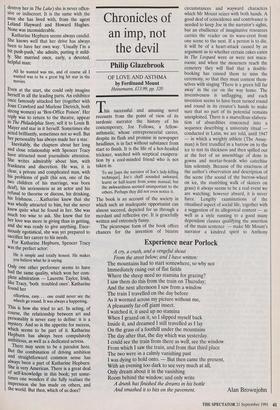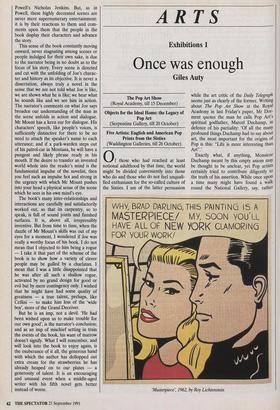Chronicles of an imp, not the devil
Philip Glazebrook
OF LOVE AND ASTHMA by Ferdinand Mount Heinemann, £13.99, pp. 320 This successful and amusing novel recounts from the point of view of its sardonic narrator the history of his contemporary, Joe Follows, a fellow- asthmatic, whose entrepreneurial career, despite its flash and promise in newspaper headlines, is in fact without substance from start to finish. It is the life of a hot-headed trickster, watched with sceptical exaspera- tion by a cool-minded friend who is not taken in.
To me [says the narrator of Joe's lady-killing technique], Joe's chaff sounded awkward, learnt or half-learnt from some manual, but the awkwardness seemed unimportant to the others. Perhaps they did not even notice it.
The book is an account of the society in which such an inadequate opportunist can almost succeed, depicted for us through a mordant and reflective eye. It is gracefully written and extremely funny.
The picaresque form of the book offers chances for the invention of bizarre circumstances and wayward characters which Mr Mount seizes with both hands. A good deal of coincidence and contrivance is needed to keep Joe in the narrator's sights, but an ebullience of imaginative resources carries the reader on its wave-crest from one scene to the next. If a person is to die, it will be of a heart-attack caused by an argument as to whether certain cakes eaten in The Leopard were or were not maca- roons; and when the mourners reach the cemetery they will find that a double- booking has caused them to miss the ceremony, so that they must content them- selves with singing 'There is a green hill far away' in the car on the way home. The inventiveness is unflagging, and each invention seems to have been turned round and round in its creator's hands to make sure that no part of its potential remains 'unexploited. There is a marvellous elabora- tion of absurdities concocted into a sequence describing a university ritual conducted in Latin, we are told, until 1947 — in which a weighty athlete (The Assay- man) is first trundled in a barrow on to the ice to test its thickness and then spilled out at the feet of an assemblage of dons in gowns and mortar-boards who catechise him solemnly. Because of the exactness of the author's observation and description of the scene (the sound of the barrow-wheel on ice, the stumbling walk of skaters on grass) it always seems to be a real event we are watching; however absurd, it is never farce. Lengthy examinations of the ritualised aspect of social life, together with a suggestion of its allegorical content — as well as a style running to a good many dependant clauses qualifying the assertion of the main sentence — make Mr Mount's narrator a kindred spirit to Anthony
Powell's Nicholas Jenkins. But, as in Powell, these highly decorated scenes are never mere supernumerary entertainment: it is by their reactions to them and com- ments upon them that the people in the book display their characters and advance the story.
This sense of the book constantly moving onward, never stagnating among scenes or people indulged for their own sake, is due to the narrator being in no doubt as to the focus of his story. Every scene is directed and cut with the unfolding of Joe's charac- ter and history as its objective. It is never a dissertation, always truly a novel in the sense that we are not told what Joe is like, we are shown what he is like; we hear what he sounds like and we see him in action. The narrator's comments on what Joe says broaden our understanding of the man as the scene unfolds in action and dialogue. Mr Mount has a keen ear for dialogue. His characters' speech, like people's voices, is sufficiently distinctive for there to be no need to attach the speaker's name to each utterance; and if a park-warden steps out of his patrol-car in Montana, he will have a pungent and likely phrase ready in his mouth. If the desire to transfer an invented world whole into the reader's mind is the fundamental impulse of the novelist, then you feel such an impulse hot and strong in the urgency with which Mr Mount pushes into your head a physical sense of the scene which he sees in his own mind's eye.
The book's many inter-relationships and interactions are carefully and satisfactorily worked out, so that its carpentry, so to speak, is full of sound joints and finished surfaces. It is, above all, irrepressibly inventive. But from time to time, when the dazzle of Mr Mount's skills was out of my eyes for a moment, I wondered if Joe was really a worthy focus of his book. I do not mean that I objected to him being a rogue — I take it that part of the scheme of the book is to show how a variety of clever people may be gulled by a charlatan. I mean that I was a little disappointed that he was after all such a shallow rogue, activated by no grand design for good or evil but by mere contingency only. I wished that he might have had some quality of greatness — a true talent, perhaps, like Cellini — to make him less of the 'wide boy', more of the Grand.Deceiver.
But he is an imp, not a devil. 'He had been wished upon us to make trouble for our own good', is the narrator's conclusion; and as an imp of mischief setting in train the events of the book, his want of marrow doesn't signify. What I will remember, and will look into the book to enjoy again, is the exuberance of it all, the generous hand with which the author has dollopped out extra cream for the strawberries he has already heaped on to our plates — a generosity of talent. It is an encouraging and unusual event when a middle-aged writer with his fifth novel gets better instead of worse.



























































 Previous page
Previous page